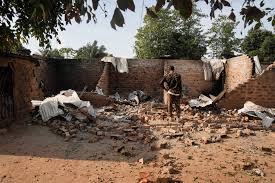President Bola Ahmed Tinubu has called on the Economic Community of West African States (ECOWAS) to classify resource theft — including illegal mining and mineral smuggling — as an international crime, warning that the activity threatens the region’s security and stability.
The President’s message was delivered by the Secretary to the Government of the Federation, Senator George Akume, at the 2025 Annual General Assembly of the Network of National Anti-Corruption Institutions in West Africa (NACIWA), held at the ECOWAS Secretariat in Abuja.
President Tinubu urged member states to rally international support against the trade in stolen minerals from the region, stressing that the rise in illegal extraction and illicit financial flows is fuelling violence, insecurity, and the proliferation of small arms across West Africa.
“Resource theft has become a driver of insecurity, kidnapping, and banditry. It is time for ECOWAS to act decisively,” he said.
Highlighting Nigeria’s efforts, Tinubu noted that his administration has prioritized asset recovery, with anti-corruption agencies retrieving significant sums. He revealed that part of the recovered proceeds has been reinvested into key social programmes, including the Student Loan Scheme and the Consumer Credit Scheme, both of which were launched with N100 billion in recovered funds.
“These programmes are now easing financial burdens for students and working Nigerians,” he added.
The President praised the Economic and Financial Crimes Commission (EFCC), currently led by Mr. Ola Olukoyede — who also serves as NACIWA President — for its record in asset recovery. He encouraged other nations to learn from the EFCC’s achievements.
He also urged NACIWA to focus on strengthening anti-money laundering frameworks, enhancing financial intelligence-sharing, and promoting transparency in the extractive industries.
Tinubu reaffirmed Nigeria’s dedication to regional cooperation in tackling corruption and insecurity. “We are stronger together than being apart,” he said, formally opening the 2025 NACIWA General Assembly with a call for collective action and meaningful reforms for regional growth.






Post comments (0)